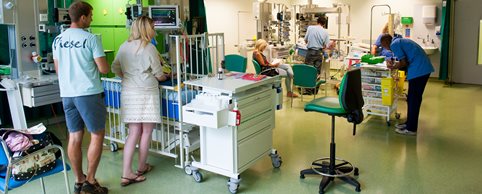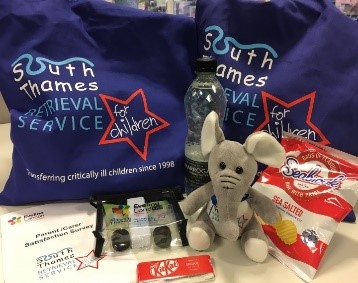
Having your child moved for intensive care treatment can be a frightening and worrying time. This page explains what you and your child can expect.
Moving your child
Your child will be cared for by a doctor, or retrieval nurse practitioner, and a nurse from the intensive care unit at Evelina London.
Our team is specially trained in making sure your child is stable and comfortable before they leave the local hospital where they have been treated and while they are being transferred. You can find out more about the South Thames Retrieval Service team.
Your child will travel in a specially-designed intensive care ambulance, or occasionally, a helicopter or plane.
Travelling with your child
 One parent will usually be able to travel with their child in the ambulance. You will be given a comfort pack with a drink and snack for the journey. It also contains a small wash pack along with Evie the Elephant, for your child once they are feeling better. These are provided by Evelina London.
One parent will usually be able to travel with their child in the ambulance. You will be given a comfort pack with a drink and snack for the journey. It also contains a small wash pack along with Evie the Elephant, for your child once they are feeling better. These are provided by Evelina London.
If you are not able to travel in the ambulance or helicopter, we will let you know the best way of travelling to the intensive care unit.
If you are driving, please do not follow the ambulance closely as this is not safe.
Having your child moved for intensive care treatment can be a frightening and worrying time. This page explains what you and your child can expect.
During your child's stay: visiting and accommodation
We will try our best to accommodate up to 2 parents and carers as comfortably as possible whilst your child is staying in the intensive care unit on Forest Ward. Find out more about visiting and staying with your child on Forest Ward page or see our accommodation page.
If your child has been moved to an intensive care unit at another hospital, please see our leaflet Transferring your child to an intensive care unit (PDF 1.51MB).
What do you think about our service?
Tell us about your experience by taking our online survey.
You can also write to us at:
STRS retrieval coordinator
Children’s intensive care
Level 2 - Forest
Evelina London Children’s Hospital
Westminster Bridge Road
London SE1 7EH